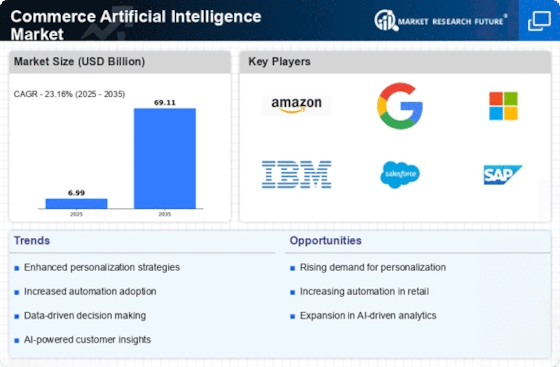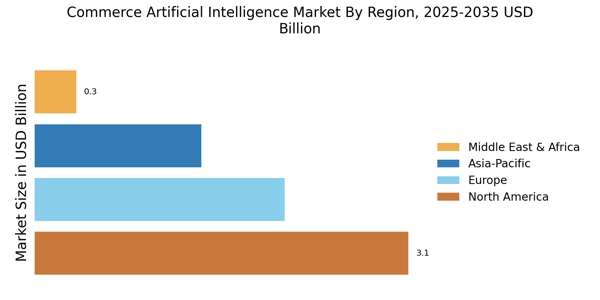Omnichannel Retailing
The shift towards omnichannel retailing is a crucial driver in the Commerce Artificial Intelligence Market. Consumers increasingly expect a seamless shopping experience across various channels, including online and offline platforms. AI technologies enable businesses to integrate these channels effectively, providing a cohesive customer experience. For example, AI can analyze customer interactions across different platforms to deliver personalized recommendations. Reports indicate that retailers adopting omnichannel strategies have seen a 30% increase in customer retention rates. As the demand for integrated shopping experiences continues to rise, the Commerce Artificial Intelligence Market is poised for substantial growth.
Enhanced Fraud Detection
Fraud detection remains a critical concern within the Commerce Artificial Intelligence Market. AI technologies are being employed to identify and mitigate fraudulent activities in real-time, thereby protecting both businesses and consumers. Machine learning algorithms analyze transaction patterns to detect anomalies that may indicate fraud. Reports suggest that businesses implementing AI-driven fraud detection systems have seen a reduction in fraud-related losses by up to 50%. This capability not only safeguards revenue but also enhances customer trust, which is vital for sustaining long-term relationships. As the sophistication of fraud schemes evolves, the reliance on AI for effective detection is likely to intensify, driving growth in the Commerce Artificial Intelligence Market.
Improved Customer Insights
The ability to gain improved customer insights is a pivotal driver in the Commerce Artificial Intelligence Market. AI technologies facilitate the collection and analysis of customer data, allowing businesses to understand preferences and behaviors more deeply. This understanding enables companies to tailor their marketing strategies and product offerings to meet specific customer needs. Recent studies indicate that businesses utilizing AI for customer insights have experienced a 20% increase in customer engagement. As competition intensifies, the demand for AI solutions that provide actionable insights is expected to rise, further fueling the expansion of the Commerce Artificial Intelligence Market.
Data-Driven Decision Making
The Commerce Artificial Intelligence Market is increasingly driven by the need for data-driven decision making. Businesses are leveraging AI technologies to analyze vast amounts of data, enabling them to make informed decisions that enhance operational efficiency and customer satisfaction. According to recent estimates, organizations utilizing AI for data analytics have reported a 30% increase in decision-making speed. This trend is particularly evident in retail, where AI tools help in predicting consumer behavior and optimizing inventory management. As companies continue to recognize the value of data insights, the demand for AI solutions in commerce is expected to grow, further propelling the Commerce Artificial Intelligence Market.
Cost Reduction and Efficiency
Cost reduction and efficiency enhancement are significant motivators for the adoption of AI in the Commerce Artificial Intelligence Market. By automating routine tasks and optimizing processes, AI technologies help businesses reduce operational costs. For instance, AI-driven chatbots can handle customer inquiries, freeing up human resources for more complex tasks. Research indicates that companies implementing AI solutions have achieved a 25% reduction in operational costs. This efficiency not only improves profit margins but also allows businesses to allocate resources more strategically. As organizations seek to streamline operations, the demand for AI-driven solutions is likely to grow, propelling the Commerce Artificial Intelligence Market forward.

















